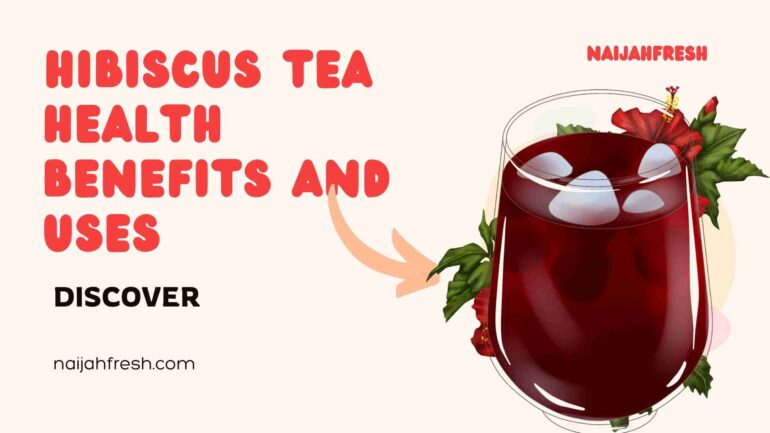Hibiscus tea, with its vibrant crimson hue and tangy flavor, has captivated taste buds and health enthusiasts alike. Beyond its refreshing taste, this herbal infusion offers a plethora of health benefits, making it a staple in various cultures around the world.
But there’s more to this floral brew than meets the eye.
From supporting cardiovascular health to aiding digestion, hibiscus tea is more than just a delightful beverage. Its rich antioxidant content and potential health-promoting properties have been the subject of numerous studies, highlighting its role in wellness and nutrition.
Curious about how this tea can benefit you?
In this comprehensive guide, we’ll delve into the myriad benefits of hibiscus tea, explore its potential side effects, and provide tips on how to prepare it to suit your palate. Whether you’re a seasoned tea drinker or new to herbal infusions, this article will equip you with everything you need to know about hibiscus tea.
Let’s embark on this flavorful journey together.
What is Hibiscus Tea?
Hibiscus tea, known for its vibrant crimson hue and tangy flavor, is a herbal infusion made from the dried calyces of the Hibiscus sabdariffa plant, commonly referred to as roselle. This caffeine-free beverage has been cherished across various cultures for centuries, not only for its refreshing taste but also for its potential health benefits.
A Global Tradition
The roots of hibiscus tea trace back to ancient Egypt, where pharaohs and high-ranking officials consume it for its purported health properties. In Egypt and Sudan, the drink, known as karkadé, is traditionally served during weddings and festive occasions. In West Africa, it’s called zobo in Nigeria and bissap in Senegal, often flavored with mint or ginger. Across the Caribbean, it’s known as sorrel and is a staple during Christmas celebrations. In Mexico and Central America, agua de Jamaica is a popular chilled beverage made from hibiscus petals.
Cultural Significance
Hibiscus tea holds a special place in various cultures:
- Africa: Used in traditional medicine to treat ailments and as a symbol of hospitality.
- Caribbean: Integral to holiday festivities, symbolizing warmth and celebration.
- Latin America: Consumed daily as a refreshing drink, often sweetened and served cold.
- Asia: In Thailand and Malaysia, hibiscus tea is enjoyed both hot and cold, sometimes blended with other herbs.
This widespread appreciation underscores the universal appeal of hibiscus tea, transcending borders and cultures.
Stay tuned as we explore the myriad health benefits of hibiscus tea in the next section.
Health Benefits of Hibiscus Tea
Hibiscus tea isn’t just a vibrant, tangy beverage; it’s a powerhouse of health benefits. From heart health to hormonal balance, this herbal infusion offers a range of advantages that cater to diverse wellness needs.
1. Supports Heart Health
One of the most celebrated benefits of hibiscus tea is its positive impact on cardiovascular health. Rich in antioxidants like anthocyanins, hibiscus tea has been shown to lower blood pressure and reduce LDL cholesterol levels. A study by the USDA found that participants who consumed hibiscus tea experienced a significant drop in systolic blood pressure compared to those who drank a placebo beverage.
2. Aids in Weight Management
For those aiming to shed some pounds, hibiscus tea might be a valuable addition to their diet. The tea contains compounds that can inhibit the production of amylase, an enzyme that breaks down carbohydrates, potentially leading to reduced sugar absorption. Additionally, its diuretic properties help eliminate excess water and toxins from the body, promoting weight loss.
3. Enhances Liver Health
The liver plays a crucial role in detoxifying the body, and hibiscus tea can support its function. Studies suggest that the antioxidants in hibiscus tea can help protect the liver against damage and improve its overall health .
4. Regulates Blood Sugar Levels
Maintaining stable blood sugar levels is essential, especially for individuals with diabetes. Hibiscus tea has been found to have hypoglycemic effects, helping to lower blood sugar levels. This makes it a beneficial drink for those managing type 2 diabetes or prediabetes.
5. Boosts Immune System
Packed with vitamin C and other antioxidants, hibiscus tea can strengthen the immune system. Regular consumption may help fend off common illnesses like colds and flu, keeping you healthy year-round .
6. Promotes Skin Health
The antioxidants in hibiscus tea don’t just benefit internal health; they also promote radiant skin. By combating oxidative stress, these compounds can reduce signs of aging and improve skin elasticity .
Stay tuned as we explore the potential side effects and considerations associated with hibiscus tea in the next section.
Potential Side Effects and Considerations
While hibiscus tea offers numerous health benefits, it’s essential to be aware of potential side effects and considerations to ensure safe consumption.
1. Hormonal Effects
Hibiscus tea contains phytoestrogens, plant-based compounds that can mimic estrogen in the body. This can potentially interfere with hormonal balance, especially in individuals undergoing hormone therapies or those with hormone-sensitive conditions. For instance, a case report highlighted that hibiscus tea might affect hormone balance, potentially impacting treatments like in-vitro fertilization (IVF).
2. Pregnancy and Fertility Concerns
Pregnant women are advised to exercise caution with hibiscus tea. The tea has been associated with stimulating menstruation, which could lead to complications such as cramping, bleeding, or even miscarriage . Additionally, hibiscus may interfere with hormonal medications, including birth control pills
3. Blood Pressure and Sugar Levels
Hibiscus tea is known for its ability to lower blood pressure and blood sugar levels. While beneficial for some, this effect can be problematic for individuals on medications for hypertension or diabetes, potentially leading to hypotension or hypoglycemia .
4. Allergic Reactions and Gastrointestinal Issues
Some individuals may experience allergic reactions to hibiscus tea, presenting as itchy eyes, sinus problems, or hay fever. Additionally, overconsumption can lead to gastrointestinal discomfort, including nausea, gas, or constipation.
5. Drug Interactions
Hibiscus tea may interact with certain medications. For example, it can reduce the effectiveness of chloroquine, a drug used to treat malaria . It’s crucial to consult with a healthcare provider before combining hibiscus tea with any medications.
In summary, while hibiscus tea is generally safe for most people, it’s essential to consider these potential side effects and consult with a healthcare professional, especially if you have underlying health conditions or are pregnant.
Potential Side Effects and Considerations
While hibiscus tea offers numerous health benefits, it’s essential to be aware of potential side effects and considerations to ensure safe consumption.
1. Hormonal Effects
Hibiscus tea contains phytoestrogens, plant-based compounds that can mimic estrogen in the body. This can potentially interfere with hormonal balance, especially in individuals undergoing hormone therapies or those with hormone-sensitive conditions. For instance, a case report highlighted that hibiscus tea might affect hormone balance, potentially impacting treatments like in-vitro fertilization (IVF).
2. Pregnancy and Fertility Concerns
Pregnant women are advised to exercise caution with hibiscus tea. The tea has been associated with stimulating menstruation, which could lead to complications such as cramping, bleeding, or even miscarriage . Additionally, hibiscus may interfere with hormonal medications, including birth control pills.
3. Blood Pressure and Sugar Levels
Hibiscus tea is known for its ability to lower blood pressure and blood sugar levels. While beneficial for some, this effect can be problematic for individuals on medications for hypertension or diabetes, potentially leading to hypotension or hypoglycemia .
4. Allergic Reactions and Gastrointestinal Issues
Some individuals may experience allergic reactions to hibiscus tea, presenting as itchy eyes, sinus problems, or hay fever. Additionally, overconsumption can lead to gastrointestinal discomfort, including nausea, gas, or constipation.
5. Drug Interactions
Hibiscus tea may interact with certain medications. For example, it can reduce the effectiveness of chloroquine, a drug used to treat malaria . It’s crucial to consult with a healthcare provider before combining hibiscus tea with any medications.
In summary, while hibiscus tea is generally safe for most people, it’s essential to consider these potential side effects and consult with a healthcare professional, especially if you have underlying health conditions or are pregnant.
Absolutely, let’s delve into the next section of your blog post: “How to Prepare Hibiscus Tea.” This segment will provide readers with a comprehensive guide on brewing hibiscus tea, including traditional methods and variations to suit different tastes.
How to Prepare Hibiscus Tea
Hibiscus tea, known for its vibrant color and tangy flavor, is a versatile beverage that can be enjoyed hot or cold. Here’s how to prepare it:
Traditional Hot Hibiscus Tea
Ingredients:
- 2 cups of dried hibiscus petals
- 8 cups of water
- Sweetener to taste (sugar, honey, or agave syrup)
- Optional: spices like ginger, cinnamon, or cloves
Instructions:
- Rinse the dried hibiscus petals under cold water to remove any impurities.
- In a large pot, bring the water to a boil.
- Add the hibiscus petals (and optional spices) to the boiling water.
- Reduce the heat and let it simmer for 10-15 minutes.
- Remove from heat and allow it to steep for an additional 10 minutes.
- Strain the tea into a pitcher or teapot.
- Add sweetener to taste.
- Serve hot or let it cool and refrigerate for a chilled version.
Iced Hibiscus Tea (Jamaica Tea)
Ingredients:
- 1 cup of dried hibiscus petals
- 4 cups of water
- Sweetener to taste
- Ice cubes
- Optional: lime slices or mint leaves for garnish.
Instructions:
- Rinse the hibiscus petals under cold water.
- In a saucepan, bring the water to a boil.
- Add the hibiscus petals and remove from heat.
- Let it steep for 15-20 minutes.
- Strain the tea into a pitcher.
- Add sweetener to taste.
- Let it cool to room temperature, then refrigerate.
- Serve over ice with optional garnishes.
Flavor Variations
- Spiced Hibiscus Tea: Add cinnamon sticks, cloves, or star anise during the boiling process for a warm, spiced flavor.
- Citrus Hibiscus Tea: Add orange or lemon zest to the boiling water for a citrusy twist.
- Herbal Blend: Combine hibiscus petals with other herbs like lemongrass, mint, or ginger for a unique flavor profile.
Note: Adjust the concentration of hibiscus petals and sweetener according to your taste preferences. Always consult with a healthcare provider if you have any health conditions or are on medication, as hibiscus tea can interact with certain drugs.
Cultural Significance and Global Variations of Hibiscus Tea
Hibiscus tea, known for its vibrant hue and tangy flavor, transcends mere refreshment—it’s a symbol of cultural identity, tradition, and community across the globe. From Africa to the Caribbean, and from the Middle East to Latin America, this crimson infusion has been embraced in various forms, each with its unique significance and preparation.
Africa: The Roots of Tradition
In West Africa, hibiscus tea is commonly known as bissap in Senegal and zobo in Nigeria. These beverages are integral to social gatherings, weddings, and daily life, often infused with local spices like ginger and cloves to enhance their flavor. The drink’s popularity is not just due to its taste but also its role in symbolizing hospitality and unity.
Moving to North Africa, particularly Egypt and Sudan, the tea is referred to as karkadé. It’s traditionally served during weddings and festive occasions, symbolizing joy and prosperity. The beverage’s deep red color and refreshing taste make it a staple in these regions, enjoyed both hot and cold.
Caribbean: A Festive Elixir
In the Caribbean, especially Jamaica, hibiscus tea is known as sorrel and is a quintessential part of Christmas celebrations. The drink is typically brewed with ginger, cloves, and sometimes rum, creating a festive concoction that embodies the spirit of the holidays. Its preparation and consumption are deeply rooted in the region’s cultural heritage, reflecting a blend of African and local traditions.
Latin America: A Refreshing Staple
In Mexico and Central America, the beverage is called agua de Jamaica. Served chilled, it’s a popular refreshment made by steeping dried hibiscus petals in water, sweetened to taste. Beyond its thirst-quenching qualities, agua de Jamaica is appreciated for its health benefits and is a common offering in homes and eateries alike.
Middle East: A Symbol of Hospitality
In Middle Eastern countries like Egypt and Sudan, karkadé holds a special place in social and religious contexts. It’s often served to guests as a sign of hospitality and is associated with various ceremonies and traditions. The tea’s rich color and flavor make it a favored choice during celebrations and gatherings.
Global Symbolism and Modern Adaptations
Beyond these regions, hibiscus tea has found its way into various cultures worldwide, each embracing it in unique ways. In Hawaii, for instance, the hibiscus flower is a symbol of beauty and is deeply embedded in local traditions.
Today, hibiscus tea continues to evolve, with modern adaptations incorporating it into cocktails, wellness drinks, and gourmet recipes. Despite these innovations, the tea’s cultural roots remain a testament to its enduring significance across civilizations.
Best Times to Enjoy Hibiscus Tea
Hibiscus tea, known for its vibrant hue and tangy flavor, offers numerous health benefits. However, timing its consumption can enhance its effectiveness. Here’s a guide to the best times to enjoy hibiscus tea:
1. After Meals
Drinking hibiscus tea after meals can aid digestion and help reduce bloating. Its mild diuretic properties assist in eliminating excess water and toxins from the body, promoting a feeling of lightness. Additionally, consuming hibiscus tea post-dinner may help lessen the absorption of fats, supporting weight management efforts.
2. In the Morning
Starting your day with a cup of hibiscus tea can be invigorating. Its antioxidant-rich profile helps combat oxidative stress, and its potential to lower blood pressure makes it a heart-healthy choice. Moreover, being caffeine-free, it provides a gentle energy boost without the jitters associated with caffeinated beverages.
3. Before Bedtime
Sipping hibiscus tea in the evening can be a soothing ritual. Its calming properties may help reduce stress and anxiety, promoting better sleep quality. Since it’s caffeine-free, it won’t interfere with your sleep patterns, making it an ideal nighttime beverage.
4. During Hot Weather
Hibiscus tea can be enjoyed cold, making it a refreshing choice during warmer months. Its hydrating properties help maintain fluid balance, and its tangy flavor can be a delightful alternative to sugary drinks.
5. Pre-Workout
Consuming hibiscus tea before exercising may enhance performance. Its potential to lower blood pressure and improve circulation can support cardiovascular function during physical activity. Additionally, its antioxidant content helps combat exercise-induced oxidative stress.
Note: While hibiscus tea offers various health benefits, moderation is key. It’s advisable to limit intake to 2-3 cups per day. Individuals with specific health conditions or those on medication should consult a healthcare provider before incorporating hibiscus tea into their routine.
Nutritional Profile of Hibiscus Tea
Hibiscus tea, derived from the vibrant petals of the Hibiscus sabdariffa plant, is not only a refreshing beverage but also a powerhouse of essential nutrients and beneficial compounds.
Low in Calories and Caffeine-Free
One of the standout features of hibiscus tea is its low-calorie content. An 8-ounce (237 ml) serving of unsweetened hibiscus tea contains approximately 2.4 calories, making it an excellent choice for those monitoring their caloric intake . Additionally, hibiscus tea is naturally caffeine-free, allowing for consumption at any time of the day without the risk of sleep disturbances.
Rich in Antioxidants
Hibiscus tea is renowned for its high antioxidant content. It contains powerful antioxidants such as anthocyanins, which give the tea its characteristic deep red color, as well as vitamin C and beta-carotene. These antioxidants help combat oxidative stress and may reduce the risk of chronic diseases .
Essential Vitamins and Minerals
While hibiscus tea is not a significant source of macronutrients, it does provide trace amounts of essential vitamins and minerals. These include:
- Vitamin C: Supports immune function and skin health.
- Vitamin A: Important for vision and immune system performance.
- Iron: Essential for oxygen transport in the blood.
- Calcium: Crucial for bone health.
- Magnesium: Supports muscle and nerve function.
- Potassium: Helps regulate fluid balance and muscle contractions.
These nutrients contribute to the overall health benefits associated with hibiscus tea consumption.
Polyphenols and Flavonoids
Hibiscus tea is abundant in polyphenols and flavonoids, including quercetin and chlorogenic acid. These compounds have been linked to various health benefits, such as reducing inflammation, lowering blood pressure, and improving cholesterol levels .
In summary, hibiscus tea is a low-calorie, caffeine-free beverage rich in antioxidants, vitamins, and minerals. Its consumption can contribute to overall health and wellness, making it a valuable addition to a balanced diet.
Frequently Asked Questions About Hibiscus Tea
Conclusion: Embracing the Power of Hibiscus Tea
Hibiscus tea, derived from the vibrant Hibiscus sabdariffa flower, offers a plethora of health benefits that make it a valuable addition to your daily routine. Rich in antioxidants like anthocyanins and vitamin C, this tart, cranberry-like infusion has been associated with:
- Lowering Blood Pressure: Regular consumption may help reduce both systolic and diastolic blood pressure, promoting heart health.
- Supporting Weight Management: Hibiscus tea has been linked to weight loss and reduced abdominal fat.
- Enhancing Digestive Health: Its diuretic properties can aid in digestion and alleviate bloating.
- Promoting Liver Health: Antioxidant compounds in hibiscus may support liver function and protect against oxidative stress.
While hibiscus tea is generally safe for most people, it’s essential to consume it in moderation. Excessive intake may lead to side effects such as stomach upset or lowered blood pressure. Pregnant or breastfeeding women and individuals on certain medications should consult a healthcare provider before incorporating hibiscus tea into their diet.
Ready to Experience the Benefits?
Whether enjoyed hot or cold, hibiscus tea is a delightful beverage that not only tantalizes the taste buds but also contributes to overall well-being. Its versatility allows for various preparations—be it a simple infusion or a creative blend with other herbs and spices.


